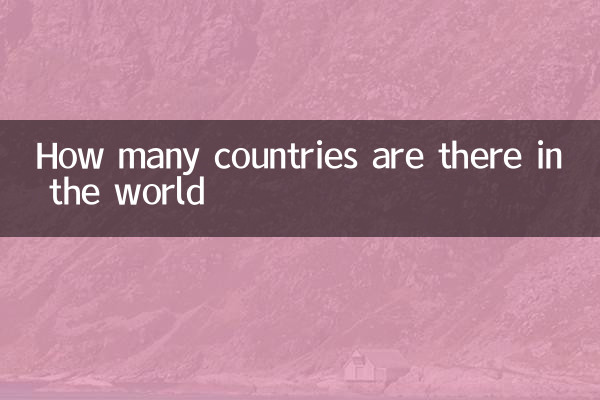How many countries are there in the world? Analyze the number of countries in the world and recent hot topics
In today's era of globalization, understanding the number of countries in the world and their dynamic changes is the basis for understanding international relations, economics and cultural exchanges. However, how many countries are there in the world? This question seems simple, but it is controversial due to different identification standards. This article will combine structured data to analyze the number of countries around the world and summarize hot topics in the past 10 days to provide you with a comprehensive perspective.
1. The controversy over the number of countries in the world

Currently, the mainstream view on the number of countries in the world is mainly based on the degree of recognition by the United Nations and the international community. The following is the statistics of the number of countries under different standards:
| Recognition standards | Number of countries | illustrate |
|---|---|---|
| United Nations Member States | 193 | A sovereign state officially recognized by the United Nations |
| United Nations observer state | 2 | Vatican and Palestine |
| Partially recognized countries | 10-15 | Such as Kosovo, Taiwan (region), etc. |
| not widely recognized country | 5-8 | Such as Western Sahara, Somaliland, etc. |
Taken together, the total number of partially or fully recognized countries and regions in the world is approximately195-210, the exact amount varies by political affiliation.
2. Inventory of global hot topics in the past 10 days
The following are the hot topics that have sparked widespread discussion around the world in the past 10 days (as of October 2023):
| hot topics | Countries/regions involved | heat index |
|---|---|---|
| Israel-Hamas conflict escalates | Israel, Palestine | ★★★★★ |
| Global AI regulatory framework discussion | United States, European Union, China | ★★★★☆ |
| COP28 climate conference preparations | UAE, many countries around the world | ★★★☆☆ |
| Global recession warning | United States, Germany, Japan | ★★★☆☆ |
| Taylor Swift concert economic impact | United States, Mexico, Argentina | ★★☆☆☆ |
3. The political and legal logic behind the number of countries
The determination of the number of countries is not a simple mathematical problem, but a complex issue involving international law, geopolitics and historical background. The following are the key influencing factors:
1.principle of sovereignty: According to the Montevideo Convention, a country needs to have a permanent population, a defined territory, a government and the ability to interact with other countries.
2.recognition diplomacy: Whether an entity is recognized by the United Nations and other countries directly affects its international status. For example, although Kosovo is recognized by more than 100 countries, it is still not a member of the United Nations.
3.Special cases: For example, Taiwan is not recognized as a country by the United Nations due to the one-China principle, but it participates in international affairs as a non-state entity in some areas.
4. Analysis of trends in the number of countries
In the past 30 years, the number of countries in the world has shown the following changing trends:
| period | Add new country | reason |
|---|---|---|
| 1990-1995 | +26 | The Soviet Union collapsed and Yugoslavia split |
| 2000-2010 | +3 | East Timor's independence |
| 2011-2023 | +1 | south sudan independence |
The number of countries has stabilized in recent years, but there are still potential changes:
-Scottish independence referendum: If successful, Britain could break up
-Puerto Rico status referendum: Possibly becoming the 51st U.S. state or independent nation
-Western Sahara question: The dispute over the last unindependent territory in Africa
5. How to correctly understand the concept of "country"
For general readers, it is recommended to understand the number of countries from the following levels:
1.academic research: Using benchmark data from 193 UN member states
2.international travel: Refer to the list of visa-free countries in your passport (usually including 195-200 destinations)
3.sporting events: The International Olympic Committee recognizes 206 National Olympic Committees
The identification of the number of countries in the world essentially reflects the evolution of the international order. As the trend toward multipolarity intensifies and new national forms and recognition models may emerge in the future, this number will continue to change dynamically.

check the details

check the details